While between deadlines this month, I was looking forward to watching Season 3 of The Traitors (US edition) to turn off my brain for a bit—so of course I was immediately plagued by analysis.
Instead of intermittently scrolling on my phone and yelling at the Faithfuls for their gullibility, I walked away from this “unscripted” show with some lessons about narrative.
I fear this post may be mostly for myself and perhaps one or two fellow Traitors fans (thank you to Anna Mercier for talking this out with me, I desperately need your follow-up post), but a) what else is new, this is always how I start a newsletter; b) my goal here is always to share whatever I’m thinking about, just in case it’s useful; and c) I promise to neither spoil anything nor require any real knowledge of the show.
So, for context, The Traitors has a simple premise: hosted by Alan Cumming, it’s essentially a game of mafia in a Scottish castle. A few contestants are trying to “kill off” the others without being found out. If even one Traitor makes it to the end, they win all the prize money; otherwise, the Faithfuls divide it.1
Up to speed? Okay, enter my castle, as Alan would say… (Picture me wearing a fabulous outfit, please.)
Lesson #1: sometimes setting feels more real when it’s a little unreal.
Whenever I pitch this ridiculous show to friends, I always include that it takes place in an isolated Scottish castle. The setting is key! Folks like to praise stories by saying “the setting was a character in itself,” and this show is a good reminder that a setting should be just as colorful, memorable, and full of quirks as a good side character.
We never go an episode without some delightfully campy Scottish details: whether it’s Fergus the groundskeeper (who I think has never spoken (?), wears a full beard, and is always lurking ominously during challenges), freezing swims in the loch, long and spooky drives through the forest while discussing who amongst you might be plotting to stab you in the back, or dramatic candlelit challenges among empty church pews, we never forget where we are. (Turning to Story would call this maxing out the vibes.)
That’s the promise of the premise, baby. We’re here for a spooky Scottish castle, and that is what they deliver. I scrolled across a video recently that said the producers clearly asked themselves how much Scottishness was appropriate, then doubled it, then doubled it again, and that is not an inaccurate take.
During the final reunion episode, they played a faux-tourism reel advertising this castle’s charms, and I jotted down something like: setting = mix of real and unreal. I think some of my favorite settings go just a little too far.
Like Emily Henry’s Poppa Squat from Book Lovers—so perfectly small-town-y, so ridiculous, and so memorable. One of the few fictional bar names I remember (the only?), because how could you forget THIS:
At the end of the block, there’s a big wooden building with rusty metal letters reading, mysteriously, POPPA SQUAT…
The hostess hands us each a menu that’s about… oh, forty pages too long, and we slide onto pleather-topped stools, setting our purses on the sticky bar and scanning our surroundings in a silence driven by either shock or awe.
This place looks like a Cracker Barrel had a baby with a honky-tonk, and now that baby is a teenager who doesn’t shower enough and chews on his sweatshirt sleeves.
…I flip open the menu and start to peruse. Easily thirty percent of the listed items are just various deep-fried things. You name it, Poppa Squat can fry it.
The bartender, a preternaturally gorgeous woman with thick, dark waves and a handful of constellation tattoos on her arms comes to stand in front of me, her hands braced against the bar… like the coffee shop/horse farm guy, she looks less like a bartender than like someone who would play a bartender on a sexy soap opera.
What’s in the water here?
(EmHen is with me, of course, even making meta-nods to the fact that this fictional town inspired in-universe fiction of its own. So, it’s definitely the real meets the unreal, which I didn’t even realize until I grabbed it to reference for this post.)
My first instinct was to say something like “obviously this won’t feel right for subtler, more ~literary~ stories,” but… mightn’t it? Isn’t the best fiction about turning up the details to make something hyper-real? Don’t we always lean into slightly oversaturated caricature in order to draw our attention to the elements of our world that we might otherwise be sleepwalking past? It will surely look different book to book, but I stand by it: dial that setting up a little.
Lesson #2: backstory only works if we were hurt by it, too.
I admit, despite being a lover of reality TV, I am far from a walking encyclopedia. While I still enjoy The Traitors deeply, I can’t shake the idea that I’d enjoy it more with greater knowledge of the contestants’ backstory. Since the U.S. version of The Traitors is populated by reality stars from other shows, many of the contestants have previous relationships. Some have betrayed each other before, others have longstanding alliances, and still others wear the goggles of hero worship.
We’re always given enough context to get the gist—but I admit, since I almost always wasn’t “there” when the drama began, the moments where the backstory is critical to characters’ decisions are kinda lost on me. Sometimes betrayals are meant to hit harder because trust was tentatively regained in this new setting, or votes are cast based on prior alliances, and I end up just… shrugging. It makes me think about the power of a well-timed flashback, or at least enough detail that we understand intimately how a character feels about a past event (which we almost never get, in this show). The damage only matters to me if I feel like I was there.
I recently reread Tracy Deonn’s Legendborn in preparation for Oathbound, and I was blown away by just how efficient but visceral the backstory felt. It’s woven in throughout, starting in the prologue, and it establishes Bree’s motivations and grief so firmly that I never questioned that she’d enter a terrifyingly dangerous and exclusive secret society to find out the truth behind her mother’s death:
Last night: she’d roared about trust and safety and not rushing to grow up. I’d screamed about unfairness, about what I’d earned, and how I needed to get away from dirt roads.
This morning: I was still fuming when I woke up. In bed, I made a silent declaration to not speak to her all day. That declaration had felt good.
Today: a nothing, normal Tuesday, except that, for me, it carried the stubborn undercurrent of We’ll talk later.
Tonight: she drove away from work at the end of the day.
Then: a car.
Now: this pale green room and a disinfectant smell that burns when I inhale.
Forever: We’ll talk later is not the same as We’ll never talk again.
The twine from February closes tight around me like I will never take another breath, but somehow the police officer is still talking, shimmering and shining.
No need to convince me this relationship matters. I feel it. And I can’t imagine caring so much about Bree’s quest—and the end of the book hitting as hard as it does—if I hadn’t “been there” when the damage was done.
Lesson #3: everyone’s the main character—maybe let someone unexpected control the narrative for a minute.
In the post-season reunion show, Boston Rob says something diplomatically vague and fascinating: “everyone has their own perception of events, and that’s what they act on.”
I find that statement both obvious and profound. The stories that most compel me are almost always the result of an author who deeply understands that everyone around us sees the same events through a totally different lens. It’s one thing to know this on a conscious level, I think, and another for it to be so deeply baked into your storytelling that it causes plot turns that upend the expected narrative trajectory because of the utterly fallible, human randomness of it all.
In this show, folks make absolutely absurd decisions that have me screaming at the TV—but they’re still choices that I absolutely understand, because they’re the result of that character’s biased filter that leads them to trust or not trust, to act boldly or cautiously, to erupt in anger thanks to a wound being poked or to take risks due to their ego. If stories are driven by that kind of kaleidoscope of perspectives, conflict feels earned, decision-making feels organic, and relationships feel complex.
I think this is a big part of the secret sauce of the show: that we as viewers know exactly who the traitors are, and from our perspective, it seems like it should be so obvious to everyone else. Dramatic irony to the utmost!
When I first started the show, I wondered if it would be more compelling if we were also in the dark and had to guess—like a good mystery or thriller novel, right?
But I actually think it’s the anticipation of watching everyone else put the pieces together—or fail to do so—that keeps us so hooked. And because of the unique ways all these fallible humans win or lose the game, we learn something new about our imperfect yet powerful perspectives in each episode. That’s the beauty of reality TV—and of literature.
I also love the goofy little moments when the contestants have space to surprise me. One of the things I love most about this kind of show isn’t the dramatic confrontations, actually—it’s the tiny, human details captured on camera.
When Ciara and Rob get paired up for a partner challenge (holding each other’s hand for eight minutes while maggots and cockrocks get dumped over their heads, cool cool cool), Ciara freaks out (same girl) and cold-blooded, calculating gamer Rob steers her through every moment. Of course this isn’t exactly altruistic—he wants to earn the money at stake if they beat the timer—but the way he gets her to close her eyes and keeps up a comforting, distracting patter of small talk the whole time? A soft side to him we haven’t seen before. Frankly, it’s romance hero material.
(And when Ciara tells him at the reunion show that she’s been watching old videos of him on Survivor and thinks he was pretty hot back in the day? Delightful. I choked, I clapped, I didn’t not ship it…)
Heart Check, my debut, has a not-small cast: the dynamics of the team are critical to the plot, and a lot of my work in revision was building out that cast of secondary characters. So many of the quirks that I think bring them alive emerged from unplanned moments when I let them play: a text conversation between two dudes somehow turns to Nora Ephron (this says great things about him, I think), or a goalie’s “superstitions” turn out to have a whole other interpretation. None of this was there until I went a little off-script and took the time to imagine what their whole stories might be.2
Lesson #4: “Fun and Games” is always more than just fun.
I saved the reminder that inspired this whole post for last, because I was so pleasantly surprised by how much better this season of The Traitors was than the previous two. And that’s because of the changes made to the challenges.
In the middle of every episode, in between high-stakes decisions about who to banish (who they think the traitors are), contestants must accomplish some difficult task to add money to the prize pot. In the previous two seasons, they felt like filler, and I fast-forwarded through them all; maybe there were some good one-liners or suspicious moments, but ultimately, everyone benefits from winning money for the prize pot, so there was no real conflict, and they rarely uncovered any useful clues! I missed nothing by skipping them.
In my mind, the challenges during The Traitors function just like the second act of your story. And the previous seasons reminded me of the easiest way to ruin this part of a narrative—setting up fun scenes that ultimately go nowhere. This is why I have students who, when we study Save the Cat structure for writing a novel, bemoan the vast, empty space of the “fun and games” beat. Thirty-percent of the book where we’re just coming up with… shenanigans?! What’s the point?!
In season three, for the first time, I didn’t skip through the challenges. Because they made them crucial to the plot.
Challenges offered actual information! Like The Seer, where the winner got to know one other player’s true identity; or that wild human-sized chess game, where contestants had to guess what answers the traitors had provided to various questions. Now I’m invested—because I know it matters, will raise the stakes, and will shift the direction of the story. Give me all the ridiculous Alan Cumming headpieces and harrowing races across the loch, yes please—but make sure I need to watch the whole thing to earn the satisfaction of the story.
Creating forward momentum in every scene is a challenging task, to be sure—but that’s good storytelling.
Thanks, as always, for keeping me company while we deconstruct some stories. I like to picture us sipping a beverage together and waving our hands animatedly as we discover more and more layers of brilliance. My students say I’ve cursed them with analytical vision, but you know what, I’m not so sure I really wanted to rot after all. I kinda think I love this show even more after breaking down how it works.
Would love to hear your thoughts: on the show, on story, on when you’re inviting me to your Scottish castle…
Much love,
🤍 Emily
Incidentally, while writing this sentence, I noticed the multiple “hooks” in the pitch that make this concept grabby to a variety of audiences—the setting, the host, the betrayal and intrigue, the stakes. Well done, Peacock.
Additional reading: one of my heroes of secondary character development is Page Powars, the master of dropping the most efficient, most bonkers details to develop a person so unique you’re like, damn, I want to buy them a coffee and pick their weird little brains. When in doubt, I ask how he would make this person come alive. Preorder And They Were Roommates for his best cast yet.


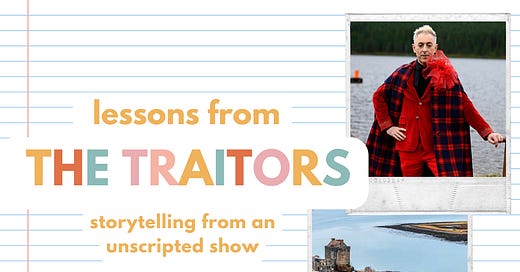


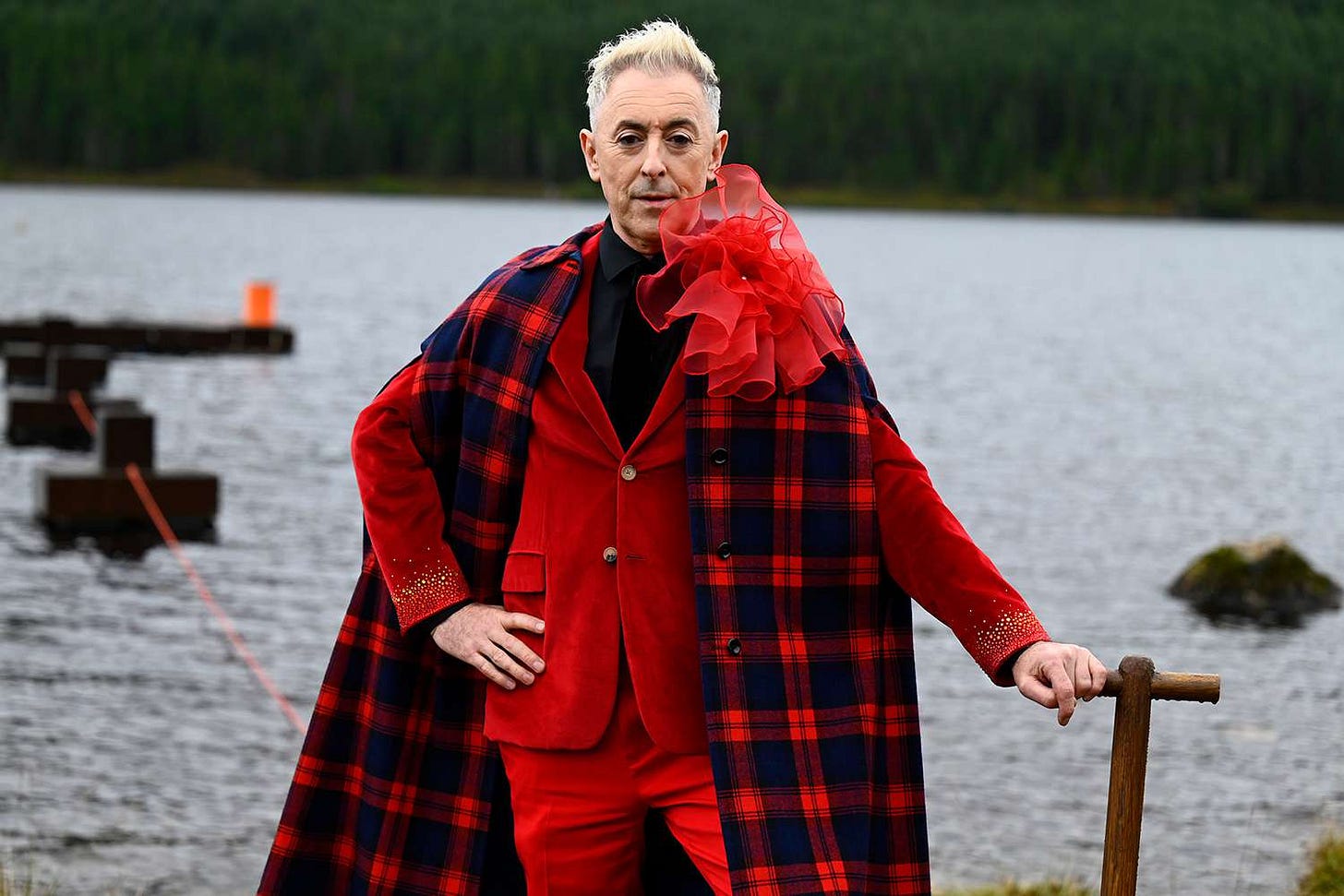
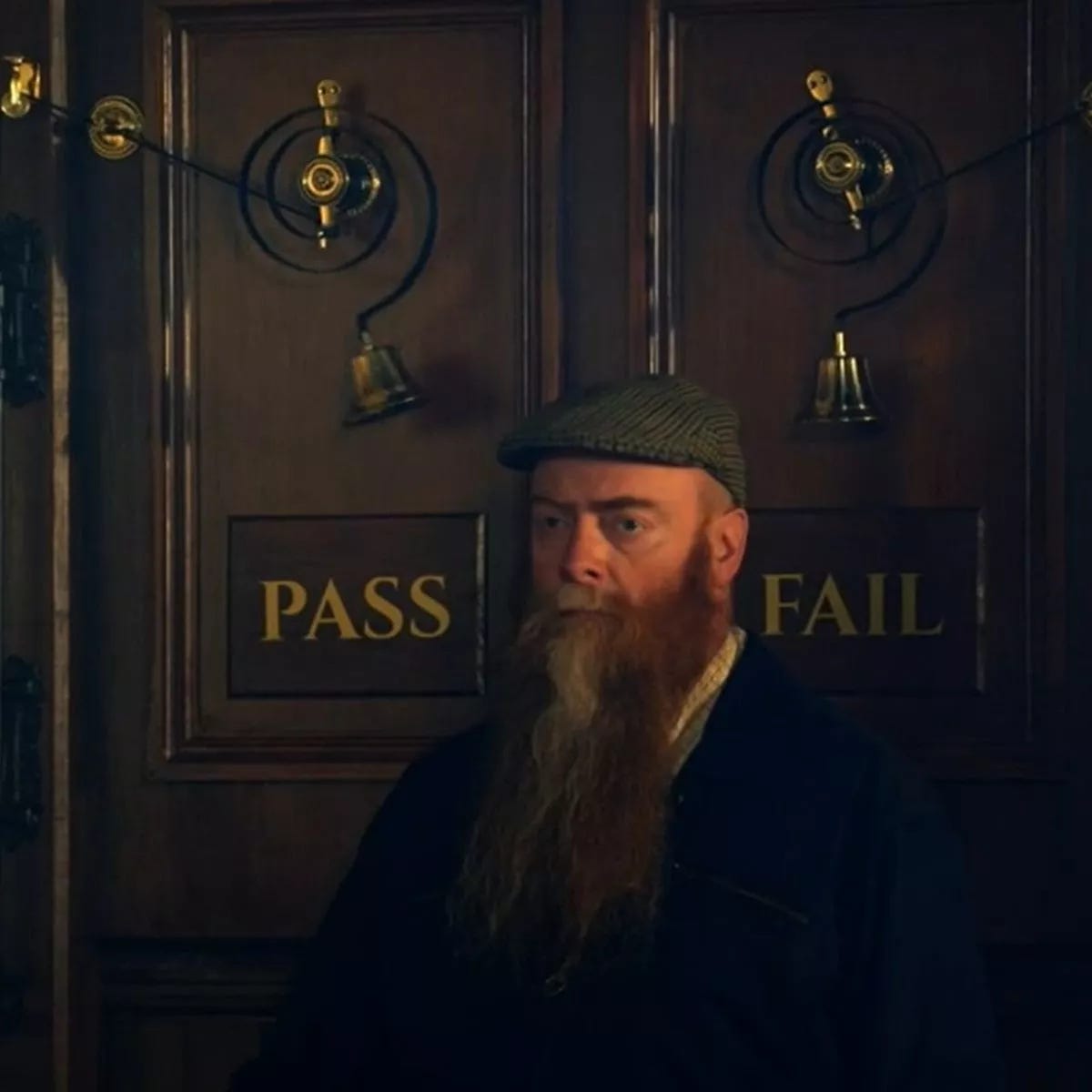
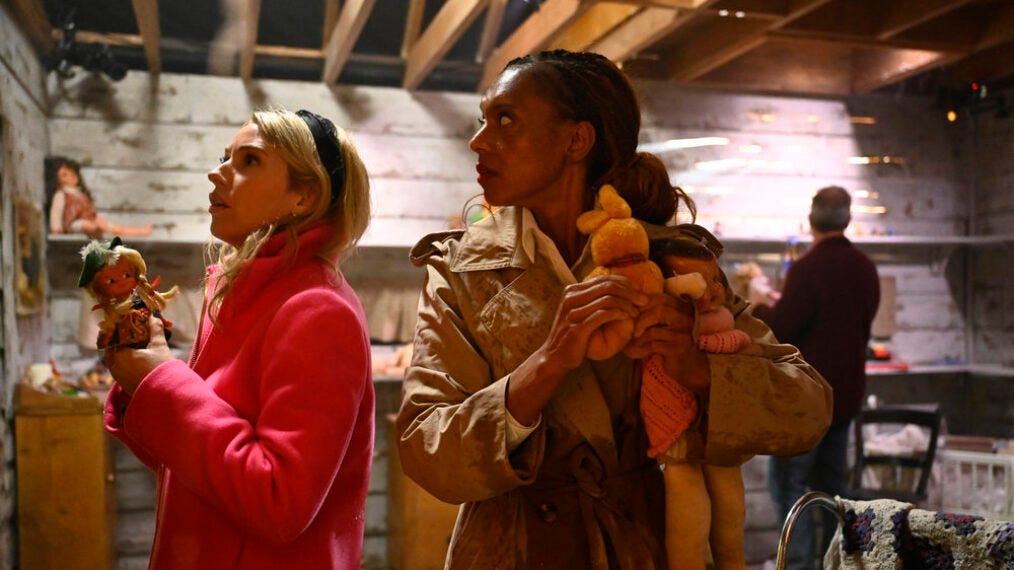


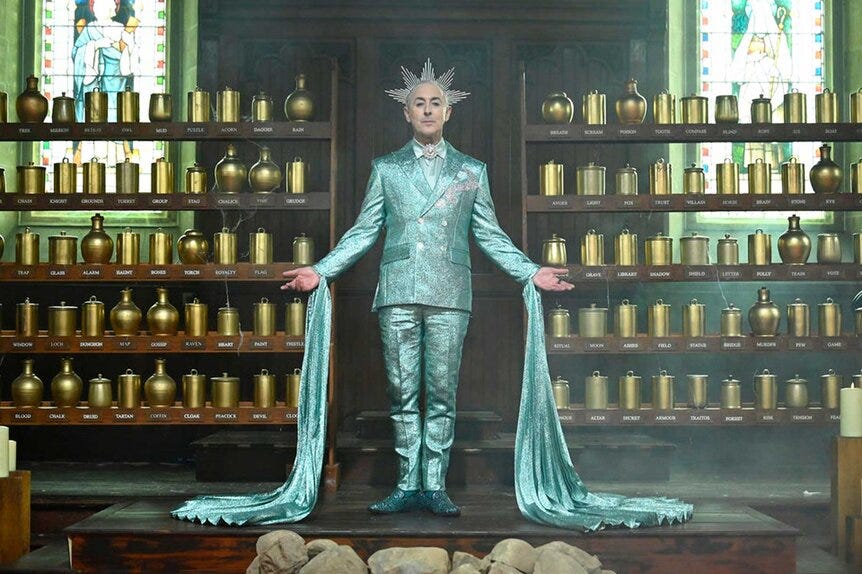

absolutely loved this read!!! big fan of any reality tv analysis, and I strongly agree with all of your points!!
I LOVE TRAITORS AND LOVED THIS READ which, yes, has been sitting open in a browser tab since you posted it so I could give it the attention it deserved 😌